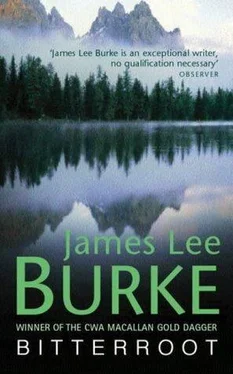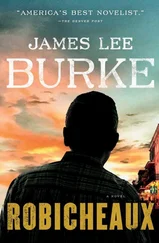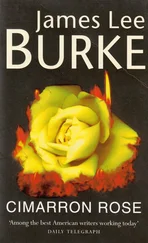"How'd I get here?" he asked.
Smoke from Lucas's breakfast fire was blowing through the trees out onto the darkness of the water. Upstream I could see Lucas standing in the middle of the riffle, false-casting a dry fly under the overhang.
"Looks like you might have wanted to wash your Jeep," I said. I found a clean cup in Lucas's rucksack and filled it with coffee from the pot on the fire, then squatted down next to Xavier and handed it to him. "How's your hand?"
He looked at the dirty elastic bandage that hung from his fingers like strips of mummy cloth. "It doesn't feel good to be my age and wonder if you're anybody's punch," he said.
I shifted my weight on one haunch and picked up a small, flat stone and flipped it with my thumb into the current. "Why'd you come out here, sir?" I said.
"I don't rightly remember. It probably made a lot of sense last night," he said.
His face was dripping with river water and he blotted his mouth and forehead on his sleeve. His eyes were puffed, as though they had been stung with bees, his breath as dense as sewer gas.
"Have you ever thought about hitting one of those twelve-step meetings?" I said.
"They're full of drunks," he said.
"I guess that's a possibility," I said, my gaze focusing on nothing.
He sat on a rock and held the coffee cup to his mouth with both hands. He tried to drink but couldn't swallow. He pressed the back of his wrist to his forehead. His fingers were shaking.
"I talked with Holly about starting up a defense fund for Doc. She said it was none of our damn business," he said. The river was still in shadow, and he stared upstream at Lucas false-casting in the riffle, as though the image of a young man in hip waders silhouetted under the lighted canopy of the forest was a reminder of someone he might have known long ago.
"Maybe she has her reasons," I said.
He pitched the coffee from his cup into the rocks. "You see a gin bottle around here?"
"It's over there, in the grass."
He walked over to the bottle and picked it up and tightened the cap on it, then tilted it sideways, measuring its content.
"I'd better go now," he said.
"Come back anytime."
"Holly worries about finances. I've gone belly-up on a couple of deals. She always thinks we're going to take on legal liability. That's why she's a lot more conservative than I am," he said.
"Makes sense," I said.
"Forget I was here, will you, Mr. Holland?"
"No problem," I said, and watched him walk to his Jeep Cherokee, his fingers spidered around the square edges of the gin bottle. When he drove into the sunlight, grinding the gears, the skin of his face seemed to shrink at the hard, bright, lonely reality of the day that awaited him.
Later, I drove out to see Cleo at her place in the Jocko Valley. When I thumped across the cattle guard I saw Cleo's gay carpenter arguing with three men in a maroon Cadillac convertible. The carpenter wore a leather tool belt and no shirt; a ball-peen hammer hung loosely from his right hand. Farther up the dirt drive I could see Cleo standing on the porch of her house.
I got out of my truck and walked toward the convertible. It wasn't hard to make the men inside. They wore slacks with knife-blade creases and sport shirts unbuttoned at the top to show off their gold chains and chest hair, and radiated a visceral self-satisfaction. Their stares were invasive, vaguely contemptuous, devoid of all empathy. The man in back was eating the last of a hot dog. When he finished, he wiped the mustard off his mouth with a paper napkin and let the napkin blow away on the grass.
The carpenter grinned at me as I approached the convertible. He flipped the hammer into the air and caught it again and slipped the handle through a loop in his belt. His skin was bronzed and his hair gold from the sun.
"These fellows are just leaving. Cleo's up at the house," he said.
"I see," I said.
"They didn't like the welcome they got," the carpenter said.
I looked the carpenter flatly in the face. Don't crowd them, bud, I thought.
"Catch you later," he said to me, and walked back toward the barn where he had been working.
The driver of the convertible was a muscular, handsome man, with smooth skin and black hair that he combed straight back. He wore a bright yellow golf shirt, and when he had drawn his car abreast of me, he said, "You got a problem, too?"
"No, I don't think so," I replied.
"Your truck's in the road," he said.
"Just pull around on the grass," I said.
"Why you looking at me like that?" he said.
"You're Nicki Molinari."
"You know me from somewhere?"
"I used to work for the G. Your picture would float across my desk from time to time."
"Sorry the recognition isn't mutual. Now please move your fucking truck out of the fucking road."
"What's your business with Cleo, Nicki?"
"Where you get off calling me by my first name?"
"You're a famous guy. No offense meant. I heard you were doing a nickel in Terminal Island."
The man in the passenger seat started to get out. But Nicki Molinari raised his hand.
"Here's your lesson for the day, whatever your name is," he said. "If that broad is your regular pump, I feel sorry for you. Second of all, I'd better not see you again."
He eased his transmission out of park and drove around my truck, across the cattle guard, and onto the county road. When I pulled into Cleo's yard, she walked down the steps toward me, but her eyes were still on the convertible that was now disappearing over a rise.
"What's with the greaseballs?" I said.
"You know them?"
"Every DEA agent in the country knows who Nicki Molinari is. You didn't answer my question. Why are they here?"
"They claim my husband owed them money,"
"What did you tell them?"
"To get out."
"Why would your husband owe them money?"
"I don't care and I don't want to know."
"These aren't guys you just run off."
"I just did. I stuck a gun in his face. He looked bad in front of his men, so he tried to give Eric a hard time. You want to come in or not?"
"I thought you might want to go to lunch,"
"I can fix something if you're hungry," she said, her voice flat, disinterested, her eyes lingering on the dust cloud left by Nicki Molinari's convertible.
"This isn't quite what I had in mind, Cleo."
"What?" she said, her attention refocusing itself on my words.
"No, I'm not hungry. I thought you might be. Maybe I should go."
"Will you just come in, Billy Bob?" she said, and pulled me by the arm, either out of irritation or conciliation, I didn't know which.
A chrome-plated.44 Magnum revolver rested on a table in the hallway.
"Just a minute," she said, and picked up the revolver and entered the den and opened a felt-backed glass gun cabinet where at least two dozen antique and modern pistols were hung. She flipped open the cylinder on the Magnum and dumped the cartridges into her palm, then fitted the Magnum on its hooks and closed the glass doors.
"What a collection," I said.
"They were my father's. He was career Army. He wanted a son."
"He taught you to shoot?"
"I taught myself. You want a roast beef sandwich?"
"Sure," I said.
On the way out of the den I saw on top of a bookcase a framed photograph of a little boy. He wore a cowboy hat and sat atop a Shetland pony. The pony was eating out of a bucket, and the little boy's legs were too short to reach the stirrups. The boy was holding on to the pommel as though he were frightened by the distance to the ground.
I followed Cleo into the kitchen.
"Why so quiet?" she asked.
Greaseballs in her front yard, her suppressed rage and grief over a murdered child, compassion for a rape victim and destitute Indians, a personality that blew hot and cold with the moment. I couldn't begin to express my thoughts.
Читать дальше












